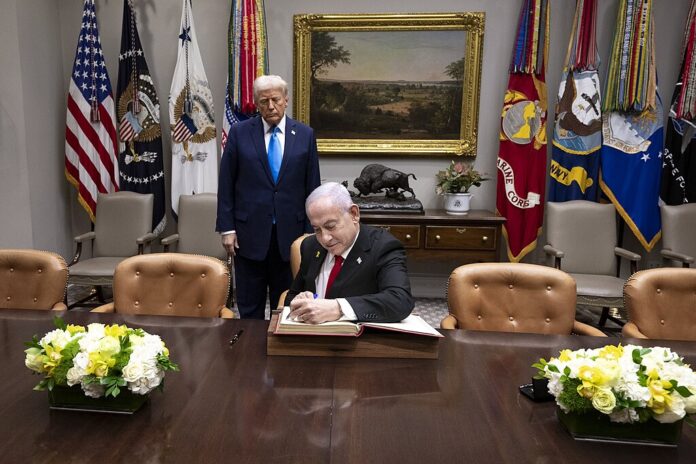Palestinian officials say Israel used talks to buy time; Buffer zone map deepens mistrust
Ceasefire negotiations between Israel and Hamas are on the verge of collapse, as Palestinian officials accuse Israel of using the Doha talks to stall for time during Prime Minister Benjamin Netanyahu’s visit to Washington.
Talks held in Qatar’s capital this week saw eight rounds of indirect “proximity” dialogue, facilitated by Qatari and Egyptian mediators and attended by US envoy Brett McGurk. However, by Friday night, Palestinian sources familiar with the discussions told the BBC the process is “hanging by a thread.”
One senior Palestinian official alleged that the Israeli delegation sent to Doha had no authority to make meaningful concessions, calling it a diplomatic tactic to “project a false image of progress” while Netanyahu courted US backing.
At the heart of the impasse are two central issues: how humanitarian aid should be delivered and the extent of Israeli military withdrawal from Gaza.
Hamas insists on UN and international agencies distributing aid, fearing Israel’s preferred channel — the Gaza Humanitarian Foundation (GHF) — lacks neutrality and is politically compromised. Israeli negotiators, backed by the US, continue to push for the GHF, though mediators say a sliver of progress has emerged on narrowing this gap.
But the greater rupture lies in Israel’s shifting military withdrawal plans.
Initially, Israeli negotiators submitted a proposal for a 1km–1.5km buffer zone within Gaza. While Hamas didn’t embrace the idea, it signalled openness to exploring it as a starting point.
That tentative trust crumbled when a follow-up map showed buffer zones as deep as 3km in some areas — including full control over Rafah, 85% of Khuzaa, and swathes of Beit Lahia, Beit Hanoun, and key eastern neighbourhoods of Gaza City like Zeitoun and Shejaiya.
Embed from Getty ImagesHamas officials saw the revised map as a betrayal. “They were never serious,” one negotiator said. “They used these talks to buy time.”
As tensions rise, Palestinian officials accuse Israel of pursuing forced displacement under the guise of humanitarian planning. Defence Minister Israel Katz has proposed a “humanitarian city” in Rafah to house 600,000 Gazans — potentially all 2.1 million people — where residents would be screened by Israeli forces and barred from leaving.
A senior Palestinian negotiator claimed this is a prelude to mass expulsion, either into Egypt or via the sea, warning of a permanent demographic shift in Gaza.
Human rights groups have denounced the Rafah camp plan as a “blueprint for a concentration camp,” drawing sharp international condemnation.
With 86% of Gaza currently falling under Israeli evacuation orders or militarised zones, the humanitarian toll continues to mount. The UN warns of a full collapse of Gaza’s remaining medical infrastructure and growing desperation among displaced families.
Despite Netanyahu’s public optimism in Washington — where he suggested a deal could be reached “in a few days” — trust on the ground has eroded.
The current Israeli offer includes releasing 10 of the 20 surviving hostages and just over half of the 30 deceased in exchange for a 60-day truce. But without clarity on troop withdrawals and aid logistics, Hamas refuses to proceed.
Diplomats in Doha say a narrow path remains, but time is running out. “This process is hanging by a thread,” one regional official warned. “Without urgent US pressure, the whole thing could unravel.”
The war, which began on 7 October 2023, after a Hamas-led assault on southern Israel killed 1,200 and took 251 hostages, has left over 57,800 Palestinians dead, according to Gaza’s Hamas-run health ministry.
